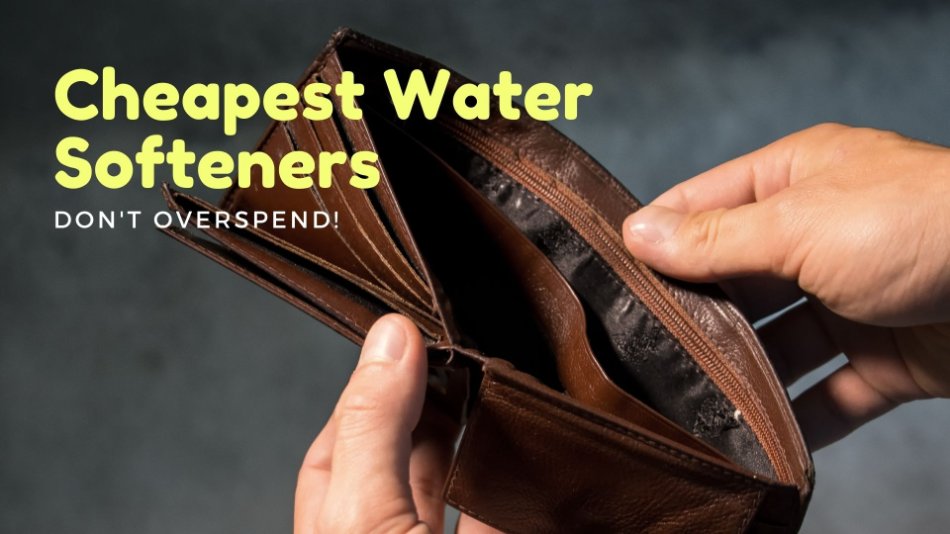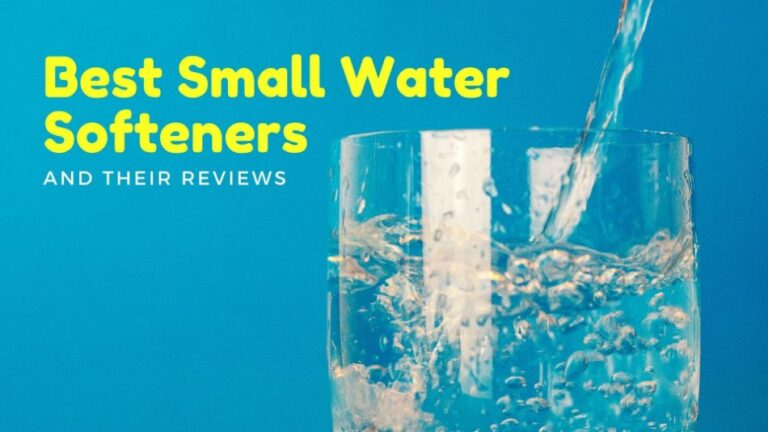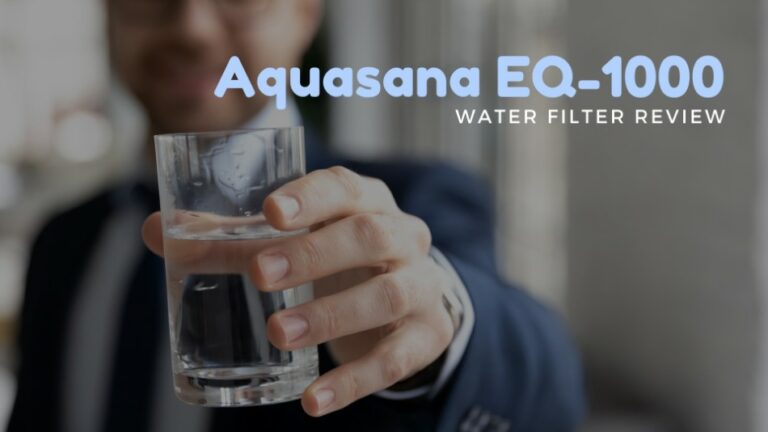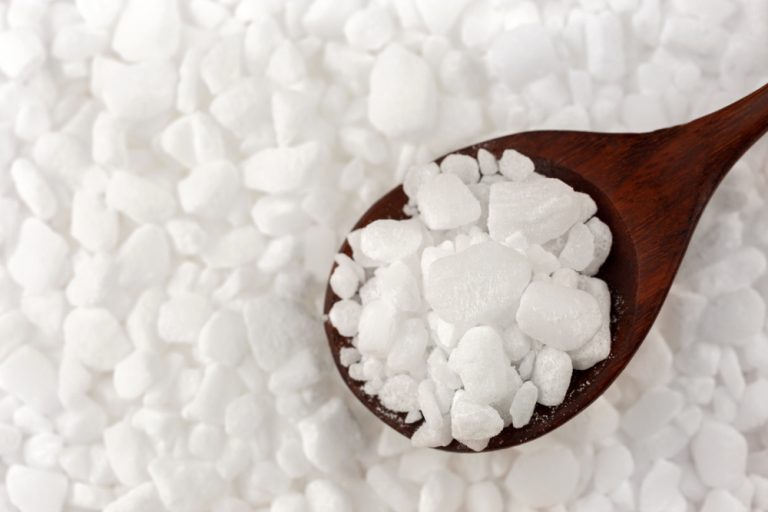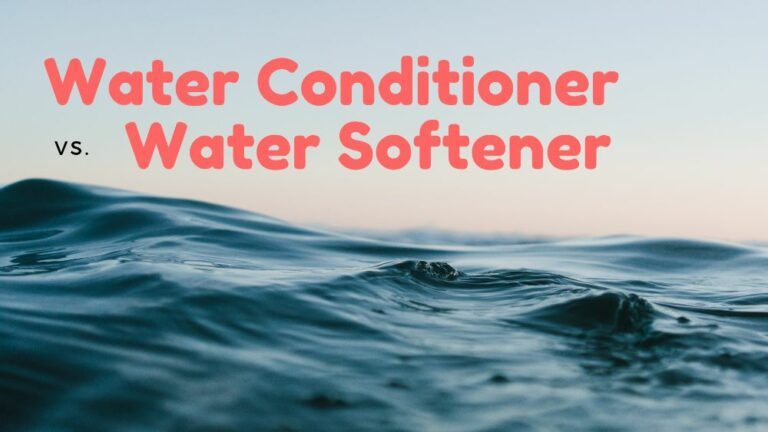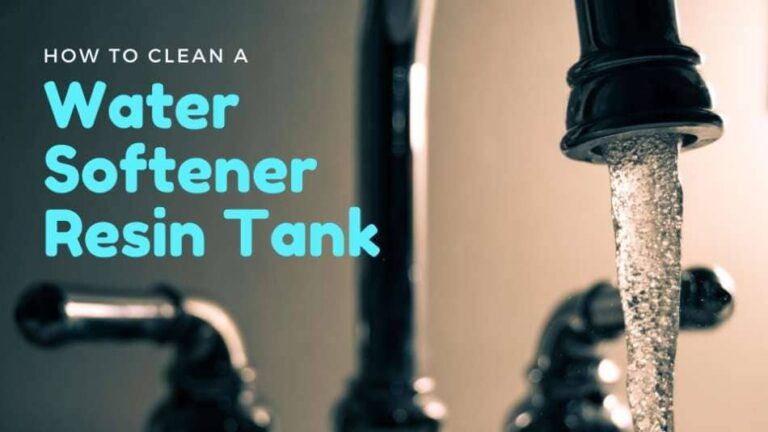Cheapest Water Softeners – Don’t Overspend!
Having hard water is an issue for many people, especially those who live in urban areas.
Not only does hard water have a less pleasant taste than soft water, but it can also cause problems with leaving spots on dishes and can present issues with plumbing. Sediments in hard water can buildup in plumbing, leading to a range of different issues.
For those who deal with hard water, a water softener is a great way to reduce the amount of calcium and magnesium in your water. These particles are broken down and removed from the water, making the water “softer”. This will help it taste better and lead to fewer problems with spotting on glass and dishes and sediment building up in plumbing.
But one problem with water softeners is that they can be pretty expensive. So, we decided to put together a list of the cheapest water softeners you can buy.
5 Cheapest Water Softeners
One thing many people get wrong is to assume inexpensive or cheap means poorly made or low in quality. While this can sometimes be the case, there are some great value softeners out there if you look for them. We have scoured the web and selected our top five picks of affordable, budget-friendly, but highly-effective water softeners.
As an Amazon Associate we earn from qualifying purchases.
Last update on 2026-02-15 at 09:10 / Affiliate links / Images from Amazon Product Advertising API
1. HQUA Salt-free Electronic Water Descaler – Cheapest Option
Last update on 2026-02-15 at 09:10 / Affiliate links / Images from Amazon Product Advertising API
HQUA is an up-and-coming brand that makes a range of water purification systems, as well as accessories. Their electronic water descaler is an affordable alternative to a traditional water softener that can efficiently remove hardness from water without breaking the bank.
It removes limescale, which also builds up in plumbing over time. No salt is required in this system, unlike with traditional water softeners. Salt can be pricey, so using a descaler will save you this recurring expense.
The system is designed for whole-house use and is well suited to providing for the water needs of an average-sized family. It is easy to install and there is no plumbing required in the installation process.
Specifications:
- Can handle 25 gpg/425 ppm
- 4 Watts
- 27 pounds
Key Features:
- Affordable
- Salt-free
- Removes limescale
- Suitable for whole-house use
- Easy installation
2. iSpring 6-Stage Reverse Osmosis Water Filtration/Softening System – Most Versatile
Last update on 2026-02-15 at 23:35 / Affiliate links / Images from Amazon Product Advertising API
iSpring is a trusted and reputable maker of a range of different water filtration systems, as well as filters and other accessories. Their 6-stage reverse osmosis system is an affordable and high-quality alternative to traditional water softeners.
This system features a powerful 6-stage layered filtration system that helps ensure water is clean, pure, and free of hardness. The system can remove as much as 99% of impurities in drinking water. The downside of this system is that it is designed for drinking water, not regular household water usage like laundry.
The system also comes with a kitchen faucet with a modern design. It is easy to install and doesn’t require any plumbing to set up. The system can remove as many as 1,000 different contaminants, creating pure, clean, and refreshing water for the whole family.
When you buy the system, you get access to online videos that help with installation and troubleshooting. They also provide live tech support to provide added peace of mind that there is help available if you need it.
Specifications:
- 6-stage reverse osmosis
- 20 pounds
- Can handle up to 750 ppm total dissolved solids
Key Features:
- Removes as much as 99% of impurities
- 6-stage filtration
- Comes with a modern-style kitchen faucet
- Removes 1,000 different impurities
- Comes with access to installation videos
- Live tech support available
3. Eddy Electronic Water Descaler – Best Descaler
Last update on 2026-02-15 at 09:10 / Affiliate links / Images from Amazon Product Advertising API
Eddy is a well-known and trusted maker of the number one electronic water descaler on the market. In addition to water descaling systems, they also sell accessories and other parts for these descaling systems. This is a great, efficient, and highly-affordable alternative to traditional water softeners.
The system is easy to install and doesn’t require a ton of plumbing to set up. The system will prevent limescale and dissolves already-existing deposits. This is a salt-free system that will soften your water without adding a salty flavor to your drinking water.
The descaler works for the entire plumbing system and can handle more than 20 gpg. This is a more environmentally-friendly alternative to salt-based water softening systems and provides the same results.
It not only reduces unpleasant taste in water, but it also reduces issues with spots on glass and dishes. Additionally, it reduces issues with dry skin and hair and leaves laundry softer and cleaner looking.
The system is a large capacity and is suitable for average-sized families. It can easily be installed in a garage or utility room and won’t take up a ton of space.
It is an electronic system that creates an electromagnetic wave that changes the chemical composition of the water. It comes with a 1-year limited warranty for added peace of mind.
Specifications:
- Can handle 20 gpg
- 110 Volts
- 5 Watts
- 8 ounces
Key Features:
- Affordable
- Number 1 descaler on the market
- Salt-free
- Easy installation
- Environmentally-friendly
- Suitable for average-sized households
- 1-year limited warranty
4. GE 40,000 Grain Water Softener – Cheapest High-Capacity Softener
Last update on 2026-02-15 at 09:10 / Affiliate links / Images from Amazon Product Advertising API
GE is a time-honored and well-known company that makes a wide range of household appliances. They have long been known to combine value and quality into home appliances that make life easier and a little bit more enjoyable. Their product line ranges from cutting-edge lighting solutions to high capacity water softeners.
Their 40,000 grain, high capacity water softener is a great value for a traditional water softening system. The system is easy to operate and features digital electronic controls. It also tells you how many days your system has before you need to refill the salt tank, taking away the guesswork in this process.
This system will need to be properly installed and integrated into your home plumbing system. It features a salt-saving system, which helps reduce the amount of salt it takes to operate the system and thus costs less in overall operational costs.
There is an exclusive blending valve in this system. This allows you to choose the desired softness of your water. These systems use up to 35% less water than other competing systems.
Additionally, the system features a self-cleaning system with a sediment filter, which is designed to help keep sediment from building up, helping enhance the life of your home’s plumbing.
Specifications:
- Can handle up to 125 gpg
- 230-pound salt capacity
Key Features:
- System is self-cleaning
- Salt-saver feature
- Days to empty salt display
- Uses 35% less water
- Easy operation
- Reduced operational costs
5. Fleck 64,000 Grain Digital Water Softener – Cheapest Softener for Large Households
No products found.
Fleck is a relatively new and high-quality maker of a range of home water purification systems, as well as filters and other accessories. Their 64,000-grain digital metered whole house water softener is a great value for those looking for a water softener that can handle the needs of even large families or households.
This on-demand digital metered water softener features a high capacity preloaded resin bed. It also features USA Pentair mineral and brine tanks to provide water as needed, but without wasting a ton of water and energy in the process.
The system comes with a 1-inch noryl threaded plastic bypass which is compatible with most standard plumbing systems. It comes with a built-in capacitor that keeps programming and memory that will remain, even if power is lost for as long as 48-hours.
The system has a meter-based regeneration system, so it is automatically put into regeneration mode when it gets too much build-up.
It even has a Pentair scan and service application that provides you with important information and details about the water softener, offers access to a troubleshooting manual, and gives you access to spare parts.
Specification:
- 64,000 grain system
- 180 pounds
Key Features:
- Suitable for large households
- Preloaded resin bed
- Pentair mineral and brine tank
- Comes with a bypass that fits most standard plumbing
- Meter-based regeneration system
- Pentair scan and service application
Water Softener Buyer’s Guide
When looking at purchasing a water softener, there are a few factors that you will want to take into consideration. The most important factors are price, type of softener, and size of softener.
Price
Firstly, like with most home appliances, price is a key consideration. It is recommended to determine ahead of time the price range you are looking within. Having a budget preset will reduce the amount of time you spend researching water softeners that are out of your price range.
Types of Water Softeners
There are four main types of water softeners and they all work in slightly different ways. These types include ion exchange, salt-free, reverse osmosis, and magnetic systems.
- In an ion exchange system, the ions in the water are replaced with sodium or potassium ions from the softening system. This is effective at reducing hardness and improving the function of pipes but is not the best type for drinking water, since it is high in salt, which affects the flavor of the water. It is also more costly to operate as special salt has to be purchased and replenished regularly.
- Salt-free systems, as the name implies, don’t use salt. Rather, they use a filter to remove sediments. This is a preferred system for drinking water, but may not be up to the task of managing really hard water. The most common type of salt-free system is an electronic water descaler. This is an affordable alternative to the traditional water softener and doesn’t take up the same amount of space and is far easier to install.
- Reverse osmosis systems rely on pressure, which pushes water and traps impurities in a semi-permeable membrane that acts as a filter. It removes as much as 98% of impurities and does not use salt, so these are an excellent choice for drinking water systems.
- Magnetic water softeners use magnets that are placed in different places within pipes. This creates a magnetic field around the water and alters its composition, softening it. This is a more expensive setup and the water returns to its previous hardness within 48-hours of leaving the magnetically-charged pipe system.
Size
One of the easiest ways to determine how much water your family uses and thus how large of a softener you need, is to get a flow rate meter. You can buy a flow rate meter at most hardware stores. This will allow you to easily measure your water consumption and you can use these figures when shopping for a water softener.
If you don’t want to buy a meter, you can do a rough home test. Put a gallon-sized bucket underneath a spigot and measure how long it takes for the bucket to fill. Divide this number by 60, and you will get a rough estimate of how much flow per minute your home can accommodate. While this won’t tell you much about your personal water consumption, it will ensure that you choose a system that is suitable for the water flow in your home.
Frequently Asked Questions
Why is grain capacity important?
In short, the grain capacity refers to the amount of hardness a water softener can remove. The larger your household, the higher the grain capacity you will want to look for. This will help ensure that you choose a system that is well suited to meet your needs.
Most average households don’t need a high capacity system, but larger families and households may need a higher grain capacity than most average-sized homes.
What does regeneration mean?
Water softeners have a resin bed that, over time, will become caked and filled with mineral and sediment particles, which can reduce the efficiency of the system.
When the bed gets clogged, the system mixes salts and water to remove the particles from the resin bed, a process referred to as regeneration.
Conclusion
While most water softeners are quite expensive, there are some options that are very budget-friendly. Electronic water descalers, while not actual softeners, achieve the same result by effectively softening hard water. Not only that, they are far less expensive than traditional softeners.
So, the cheapest water softener you can get today is the HQUA Electronic Water Descaler. With a descaler like this, you won’t even have to replenish the salt, which can be pricey over time.

